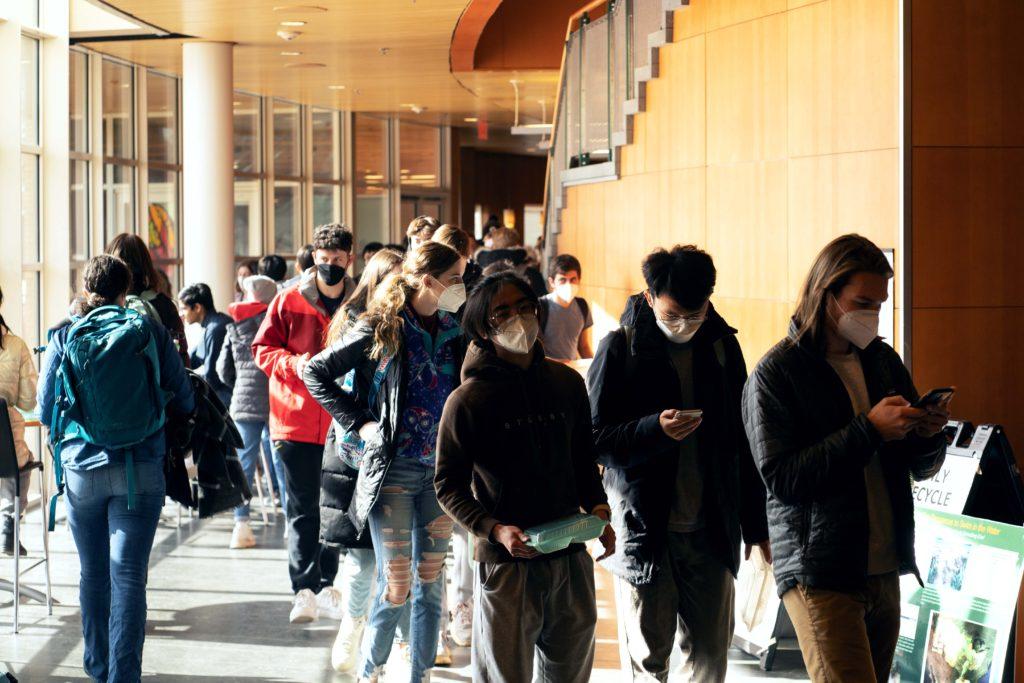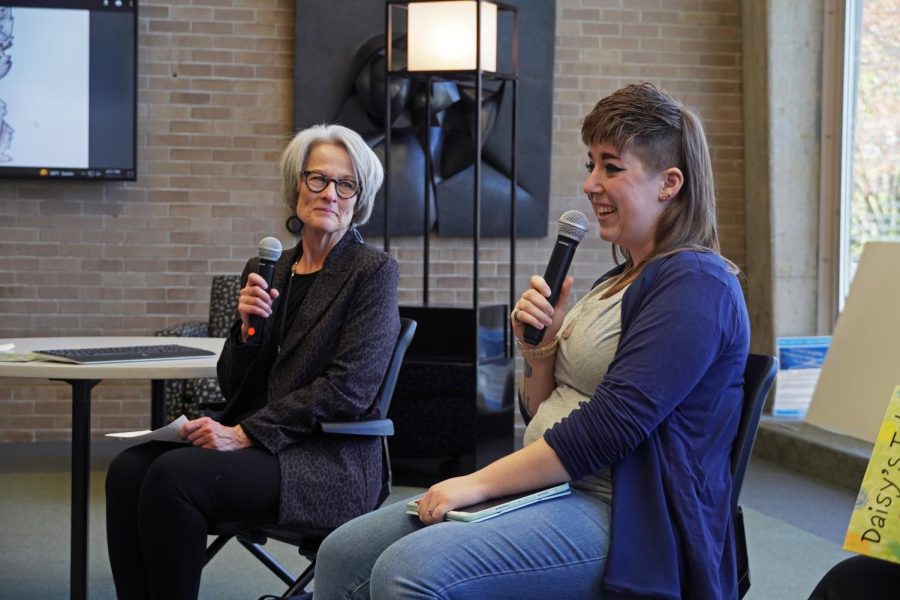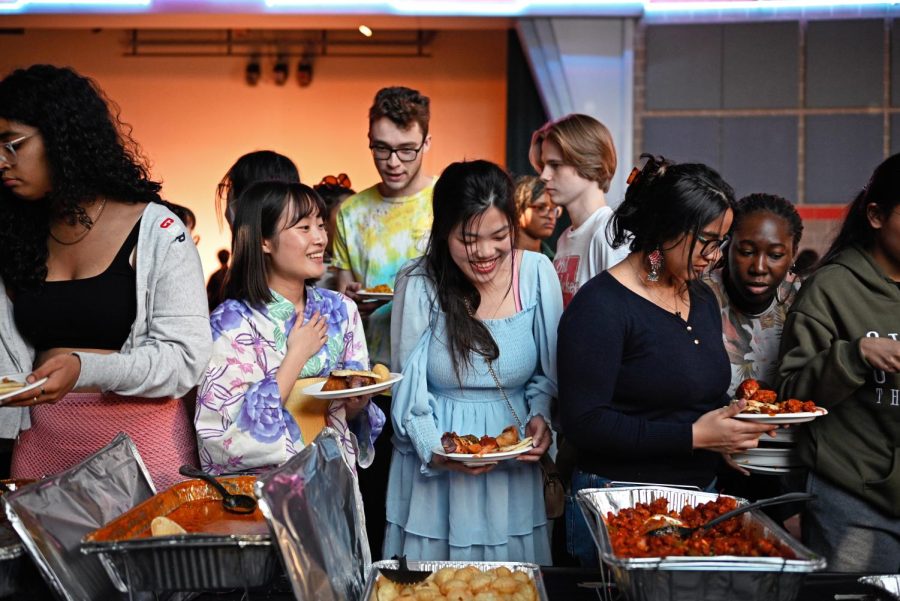By Will Donaldson
donaldso2@grinnell.edu
As a dish room student leader, I am painfully aware of our Dining Hall’s precipitous slide into disorganization and disarray. During my first year on campus (2019-2020) the Dining Hall operated at nearly full tilt. On any given day, all stations were staffed with full-time and student workers providing myriad options for student, staff and visiting diners. Even though the dining hall at that time was technically understaffed, we were still able to open each station and maintain them with minimal difficulty.
In those days, the dish room was bumping.
Dish line shifts were usually filled to the brim, with all stations attended to. I made friends with my comrades on the dish line, danced throughout the shift and was so enraptured with this hidden Grinnell community that I decided to become a student leader. Work in the Dining Hall was challenging, sure, but it used to be fun.
As a student leader who has worked through the Dining Hall’s highs and lows, I can say that what’s been missing in campus discourse about the Dining Hall is an understanding of how we reached this low point — and what’s needed to return the Dining Hall to a fully-staffed, well-oiled food service operation.
The pandemic hit the Dining Hall hard; resignations began trickling in. A handful of our amazing cheery checkers, most of whom belong to high-risk populations, decided that working a modified Dining Hall was not worthwhile.
When the College announced that we would all be returning to campus this past fall, many of us wondered whether our dining experience would return to normal. Sure, we’d have to mask up to get our food, but we could still enjoy a plethora of options and eat each meal with our friends. Right? Not quite.
We tried to proceed as if we were creating a new normal. Dining Services hired a new catering supervisor and offered catering positions back to those who had integrated with the pared down Dining Hall operations. The Spencer Grill was set to be back to regular hours and the Marketplace was prepping for full-scale, in-person dining. Student interest in working at the dining hall at the start of last semester was measurable but low. Half of our student body has never seen Grinnell in non-pandemic times. After hosting our NSO training program, Dining Hall supervisors and student leaders were already doubting whether we’d be fully staffed — even if each of our trainees picked up a handful of shifts each week.
The first few weeks of fall semester were hell. Shifts remained unassigned, we didn’t have enough full-time staff and cracks were beginning to show. Half of the stations remained closed several days of the week. The few of us that worked consistent hours were under intense stress. About a month into the semester, students started dropping their shifts to find employment elsewhere. I don’t blame them. Due to understaffing, students consistently had to move to positions they hadn’t signed up for. The dish line, our only truly popular commodity in the dish room, was worked by a skeleton crew. Our supervisors have taken the brunt of the stress from these staffing shortages. Their schedules generally consist of grueling eight-hour shifts for five days a week. Two supervisors have left in the past two months, and our remaining supervisors now consistently work overtime.
There will be more to follow. In a candid meeting between student leaders and supervisors last week, one of our supervisors told us that the only reason he was still here was because he cares about the student workers. But he was also blunt: he’s looking for other jobs. Each time I deliver clean dishes to the kitchen or to one of our Marketplace stations, I hear snippets of conversation about resumes, wages of other positions and the hunt for more gratifying employment.
Our Dining Hall is in crisis. The staff shortage is the biggest contributing factor. In a student leader meeting last semester, I asked one of the Dining Hall administrators whether the College was making extensive efforts to hire more full-time staff. They have. They’ve gone to and hosted job fairs in some of the towns surrounding Grinnell. They’ve received applications and have hired some new staff. But interest remains low, and without a huge influx of labor, new workers see just how stressful this environment has become.
One point of common ground that I’ve noticed in discussions with supervisors and other full-time staff is that student workers need to be paid more. A higher wage would no doubt lure more students to pick up shifts. The Union of Grinnell Student Dining Workers (UGSDW) conducted a survey with over eighty former student workers asking if they would pick up a shift if Dining students were paid a $15-an-hour wage. A majority answered yes. And it’s clear to both full-time workers and long-time student staff that raising the wage and garnering more workers would lessen the burden on all of us tremendously.
Ultimately, the decision-making on Dining Services’ wages and operational norms do not rest with those of us contributing the most to its efficiency. Instead, those decisions rest with the College’s administration, whose lack of transparency and open communication with Dining Services has been a detriment to the Dining Hall’s functionality. Grinnell’s administrative team produces the plans, like the initial grab-ang-go model at the beginning of the semester, without a holistic understanding of its effects on the Dining Hall — and then demands that Dining Services implement it.
The College may try to reason that it is difficult to plan during a pandemic. In some ways this is true. But it doesn’t mean they should unilaterally make sweeping, repressive policy changes without laying out the reasoning and the contingencies for their removal. Imagine if the College had announced the Dining Hall changes but also laid out their concerns and the potential ramifications for returning to in-person dining. Try this: We are concerned about an arrival outbreak but will likely remove these restrictions after two weeks of onboarding testing without a significant spike in cases. It would have been as simple as that. Now that we have returned to in-person dining, I’m sure much of this discourse surrounding our beloved Dining Hall will die down. But it shouldn’t. It just needs to shift its focus to garnering better wages for our student workers and retaining and hiring more full-time workers. Notice how we’re using disposable plates and cutlery? My supervisor told me that our depleted dish room staff could not handle reinstating the use of our usual tableware.
The crisis in Dining Services is far from over. We must continue to pressure the College’s decision-makers into more transparency and paying student Dining Hall workers a $15-an-hour wage.








































































